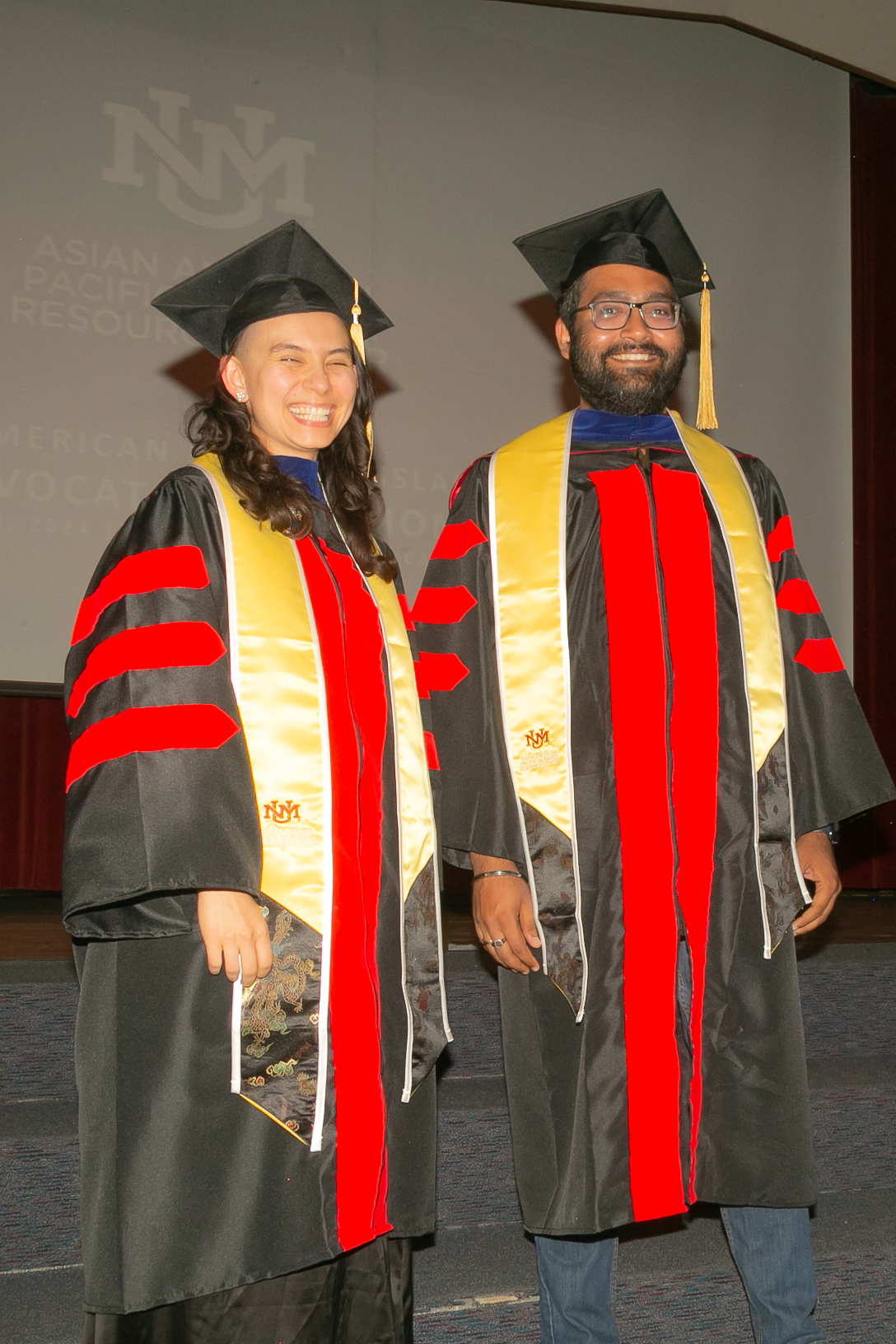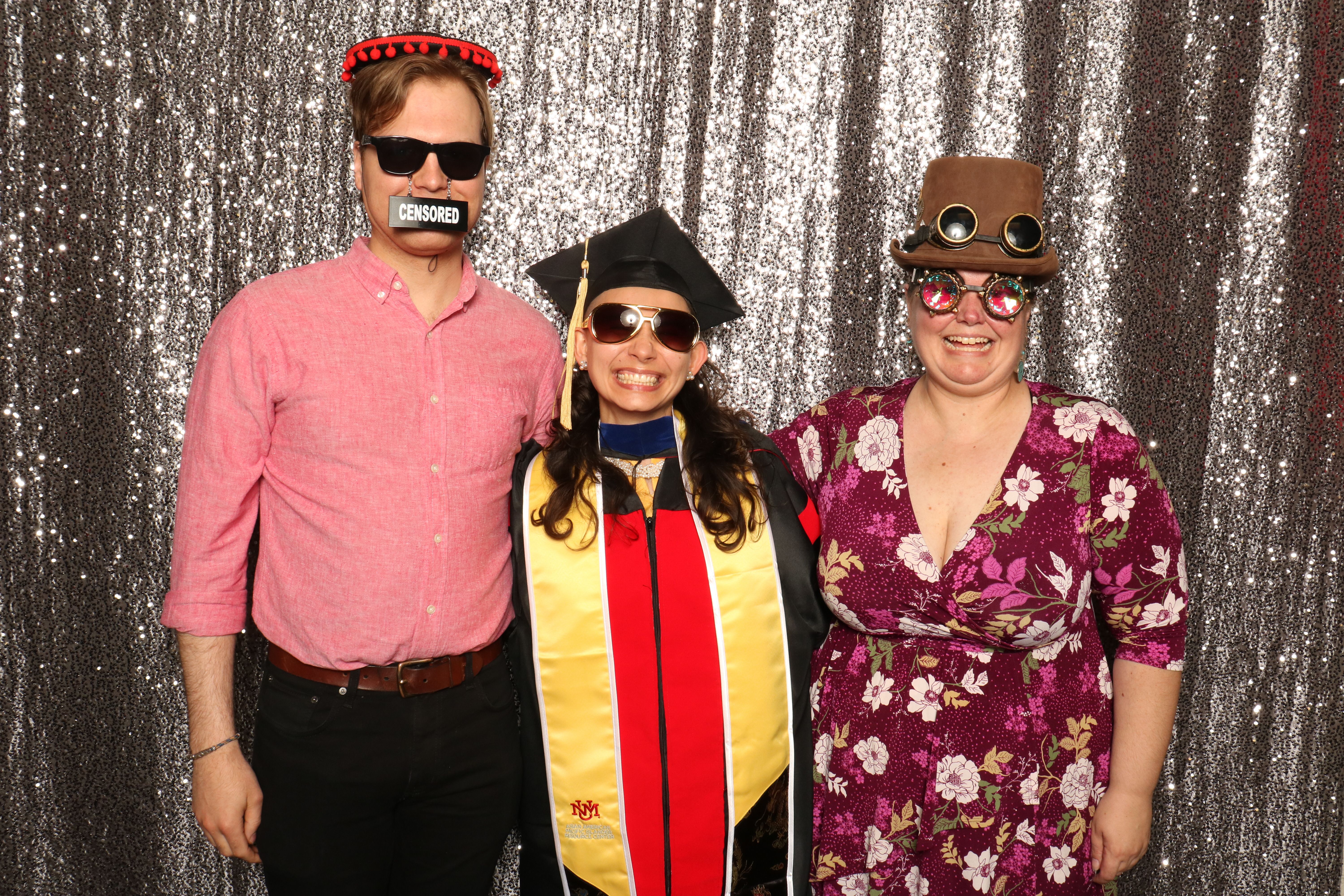AAPIRC Graduation 2024 : PHD Speech
By Paulina Przystupa | May 4th 2024

I didn’t know what to talk about today. Should I talk about the state of the world as Heba so elegantly has, my identity as a Filipine and Polish person or, what it’s like to be a graduate student for 12 years and counting. But, that would repeat things already said or likely only speak to those with similar backgrounds, heading towards 2-year Master’s degrees, or joining me in the decade-long pursuit of a PhD. Others have different experiences or are heading off to jobs, or gap years, or to take care of family or loved ones or your community. Some might only know that they're heading to the excellently DJ’d Halal Pan-Asian dinner that accompanies this ceremony.
And so I want to highlight something that no matter where we’re heading, we all share. Obviously, we’re all Lobos, or lobo adjacents to include our guests, and we share the communities and practices that make that part of our story. So, I want to remind everyone to recognize and appreciate the importance of the many communities and the practices that bring us together to be here today and help make us who we are.
But, as a PhD student, I’ve learned the necessity of definitions. So, For the purposes of this speech, community means a group of people that you interact with on a regular basis, the folks who support you—even in small ways—that you reach for when you need help, or accomplices. Practices, on the other hand, are things that you do regularly that have meaning. They are meditative, cultural, religious, political or one of many other descriptors.
My first week as an anthropology graduate student, I volunteer to go with someone I have just met to a free yoga class. Before accepting my offer though, she asks me, "Have you ever done yoga before?" I say with the confidence of youth, "No" assuming it will be easy because yoga is just…like...stretching...right? She responds, "It's probably going to kick your ass, and if it doesn't today, you'll probably feel it tomorrow." I don't remember if I feel it the next day, but I do feel like I like it.
So, I pick up the practice. Spending 70 bucks a semester (which feels like a huuuge amount of money on a Graduate Assistant's salary) I attend evening Yoga in Johnson gym, making time for it between writing papers, reading, and figuring out what I want to research. After that initial class though, I tend to go to yoga alone and everything seems to be going well.
Until one night. I'm waiting to get into the room and another student, not the Yoga teacher, comes up and tells me I'm doing downward dog wrong. I'm making more of a crescent shape than the proper A-Frame style one. I say something noncommittal, and she leaves me alone. I walk into Yoga self-conscious and seething. Who was this person? Why did she think it was her place to correct me? She doesn't know me or my level of flexibility! She makes me feel judged by other students. And while judgements or evaluations cross our minds, without someone’s permission, I never consider it my place to comment or critique someone else’s practice, yoga or otherwise. But that person did, and I begin to question if the community created by that evening class is right for me.
Slowly, I shift to a midday class instead where I settle in with a new teacher and a more relaxed community of yoga practitioners. I peacefully and safely focus on my meditative practice without the fear of another student’s judgement. I'm a regular at lunch yoga and then four and a half years into this, I dip my toe and then plunge into practicing aikido, a Japanese martial art.

While I find it intimidating to start a martial art at 26, my years with yoga guide me. They provide a foundation to keep my body safe while I learn to roll and fall as part of this new practice. And eventually, aikido becomes my main meditative movement because one thing that it gives me, that yoga doesn't, is a social community. Myself and my fellow aikidoka grab food together and I make friends who aren't graduate students in my department. Eventually though, my aikido community finds a space off-campus and I decide to spend my meagre graduate wages on dojo dues rather than yoga classes but I keep up my yoga practice where I can.
Then, 2020 marches in and I gratefully rely on my aikido community through lockdown, but I realize my yoga practice is fading. As much as I enjoy yoga, I struggle to practice alone. Even though yoga is a personal practice where I attune to my own meditative needs in physical form, I enjoy doing yoga with people. Although its not the same kind of community as aikido, I need to practice yoga alongside others, with the background of their energy. A community of folks all focusing on the same meditative motions.
And then in the Summer of 2022 I receive an e-mail in my inbox. The new UNM Asian American Pacific Islander Resource Center is open and offering free yoga classes. And it just fits. I make time to be there, hopping on my bike, commuting to campus again for the first time what feels like forever, and sheepishly make my way into AAPIRC.
Admittedly, I feel a bit like a dinosaur being there, having been in graduate school for 10 years in 2022, but I meet a new community. We do yoga as a physical practice but it’s also a place for us to express how we feel and where folks can move or rest as their bodies need, and a place for meditative and spiritual practice. Beyond that, I share in the community that is the next generation of AAPI students and scholars, all you graduates. I see your art and decorations, your events, advocacy, and the gatherings that provide places for social, political, and physical growth as well as academic success.
For Fall 2024, I look forward to finishing up my last semester amongst these communities and practices with other AAPI students and love seeing these communities grow around practices like yoga, language cultivation, and trying new things through events, providing safe space to test out what nourishes us. But sometimes in the rush to get our degrees, to succeed academically we forget to hang on to, cherish, and take pride in those practices as well.
Yes, college is a time to learn, to expand your mind, to get qualified to do your profession. But it’s also where we cultivate our practices, whether they’re cultural, religious, spiritual, political, or physical, and what kinds of communities we enjoy, and, want to support. We explore and discover what and who nourishes, cares for, and protects us. And while you may not have found those yet, or considered them, too focused on making sure you passed your final classes, take a moment now to reflect. What practices and communities helped you succeed and paved the way for you to be here today, a graduate or a soon to be graduate. And which of those can you help. Build. so that we all can share in a safe and nourishing future?
